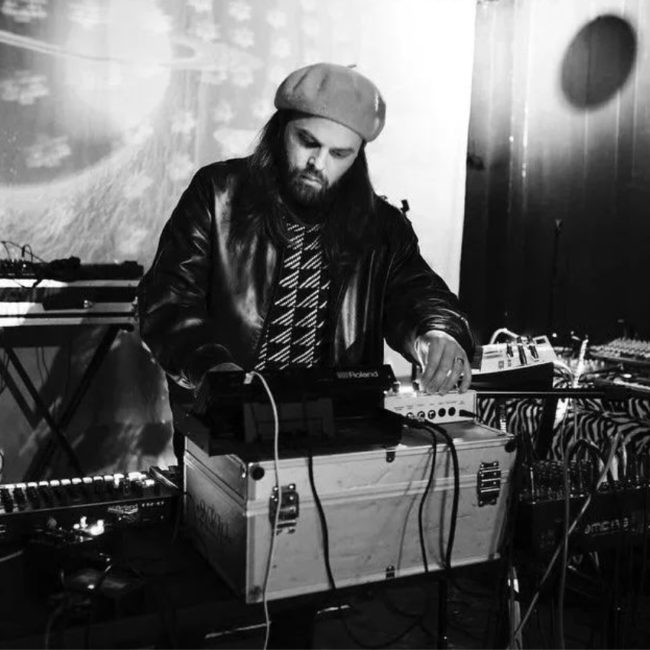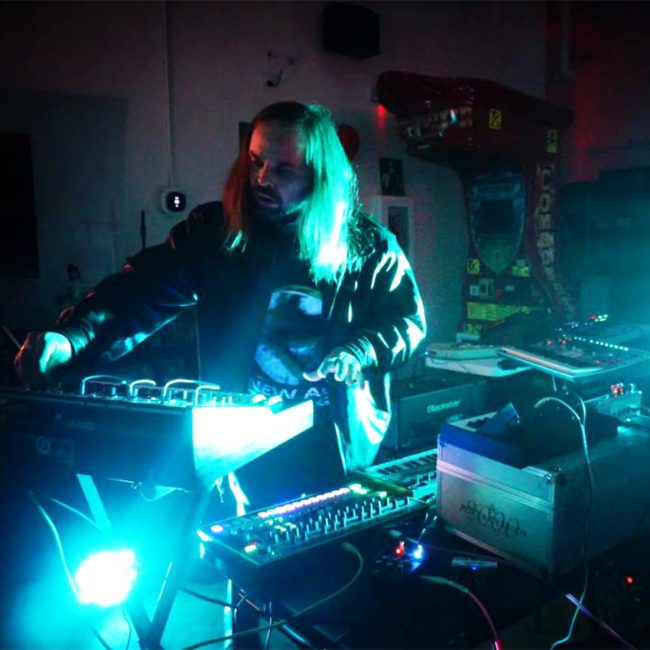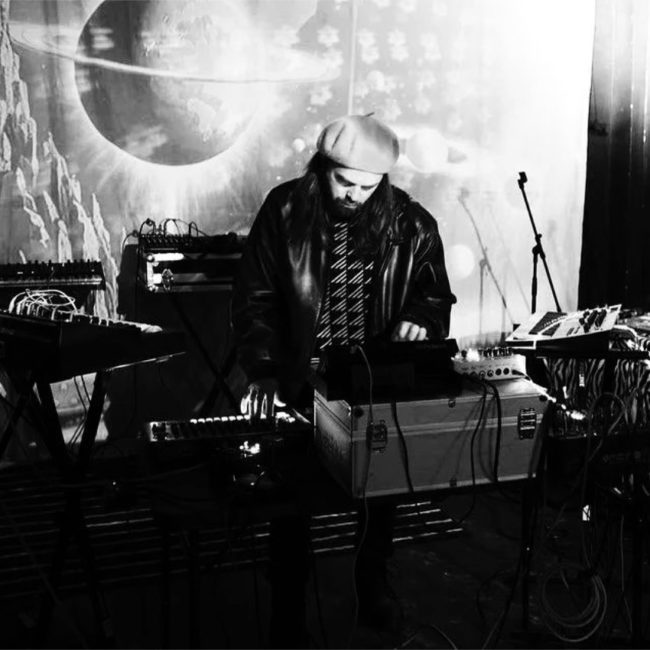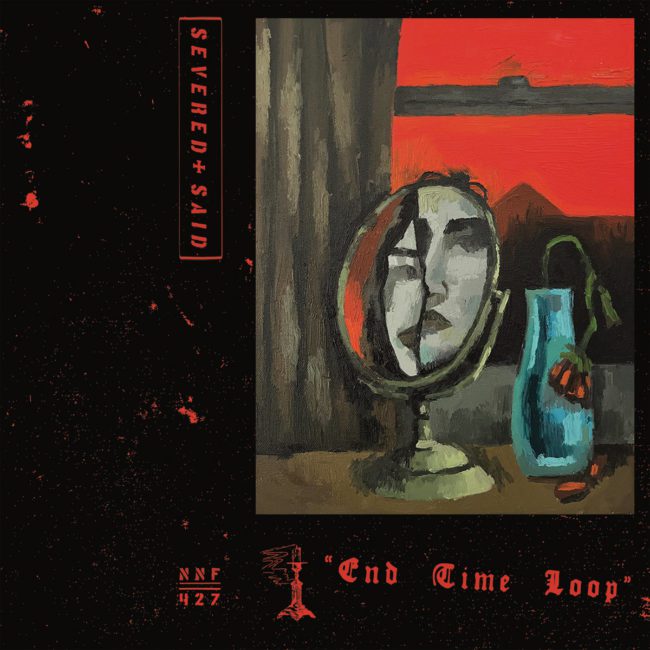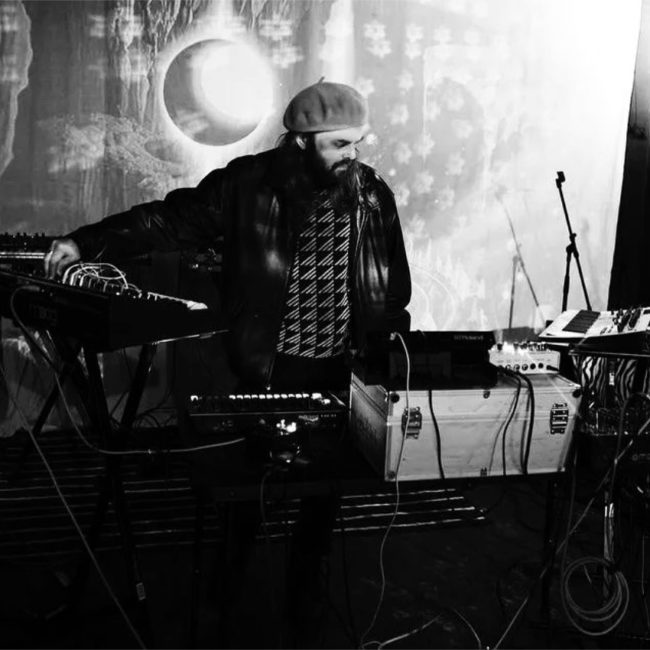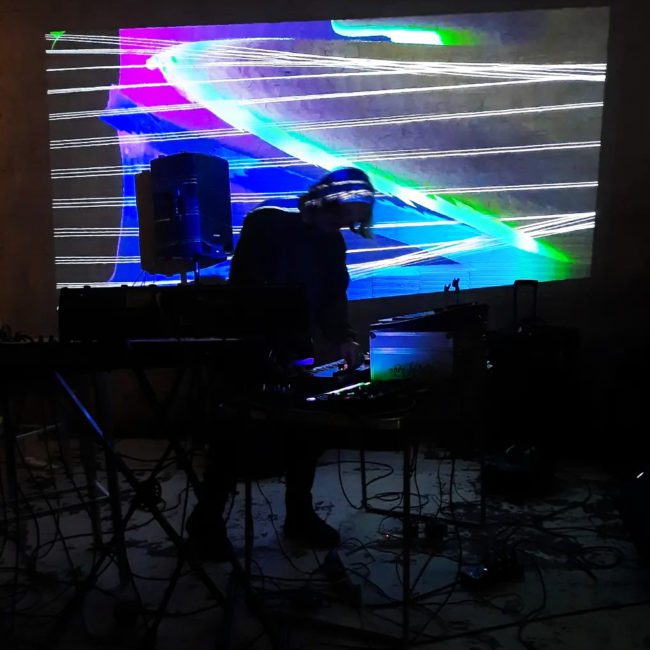Jacksonville-based producer Severed+Said explores the darker side of the Sunshine State. With longstanding roots in Florida’s DIY underground music scene, John Touchton started the project as an outlet for damaged, goth-adjacent synth instrumentals.
Over the past decade Severed+Said has evolved into a collection of moody, noir-inspired synth works over atmospheric, soundtrack-like ambient drone. His latest cassette album, ‘End Time Loop’, was refined over the past two years, and it scores apocalyptic visions influenced by Touchton’s upbringing in a Pentecostal church. The album stands as the project’s best release to date, unleashing extended, fractured ASMR that puts you in a state of unease with its dark twists and turns.
It was timely that we exchanged messages while a real life apocalypse was occurring in the American Southeast with the dual onslaught of Hurricane Helene and Milton. We caught up via e-mail as Touchton enlightened us with the origins of the project, his recent tour with Akasha System and Justin Depth, scoring the classic silent film ‘The Cabinet of Dr. Caligari‘ and navigating life as a working musician in an increasingly algorithm heavy landscape.
Interview by Jason Cabaniss
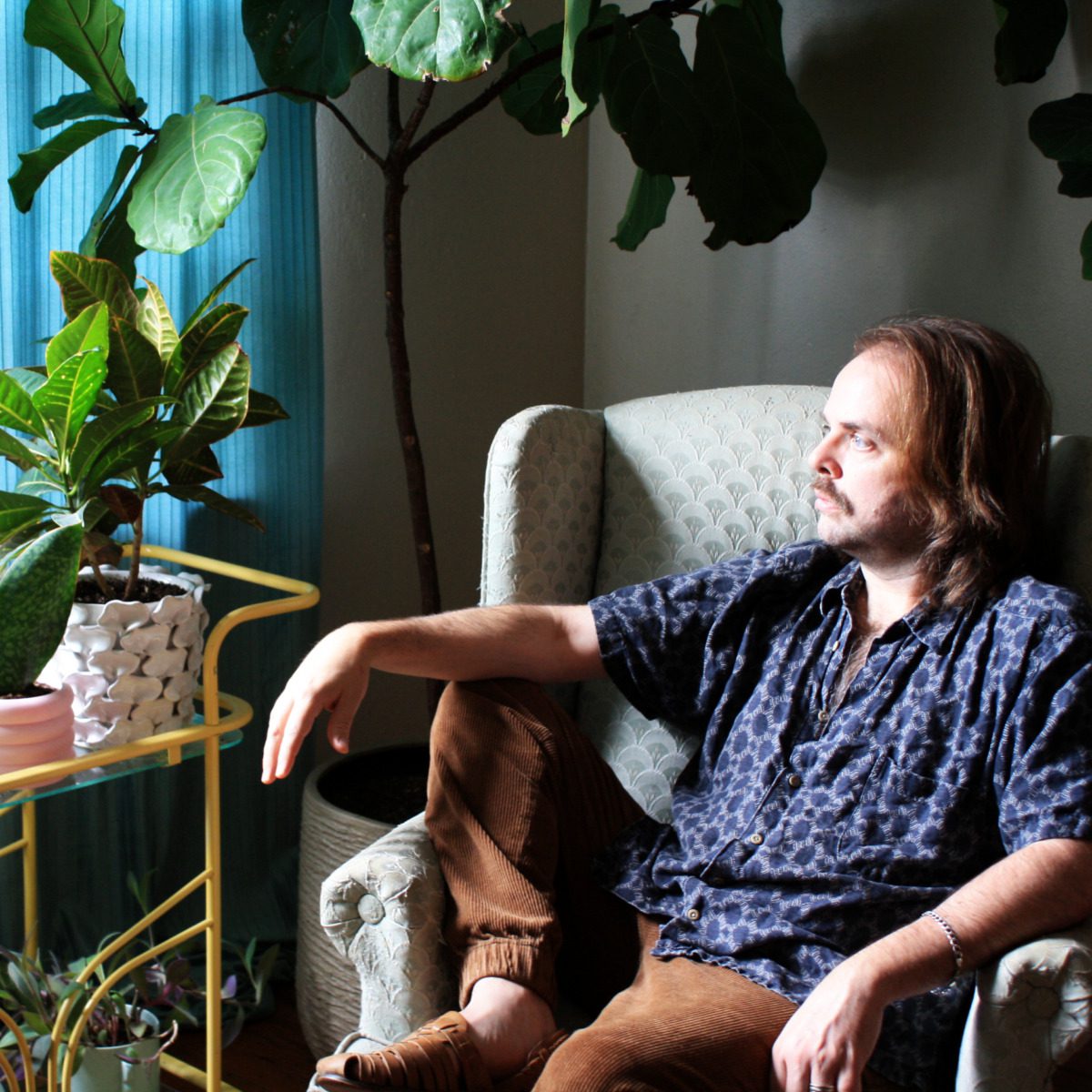
"There’s something about a warm, low end drone that evokes a vague sense of being in utero. Contrasting that with some of the more complex themes of S+S compositions, I hope to stoke the audience into an introspective, even meditative state."
Hello John, thank you for taking the time to speak with us. You just finished up the Humid Seance tour with Akasha System and Justin Depth. Tell us how that went and how the crowds responded to your new album?
Hey Jason, I’m happy to answer some questions with you. Thanks for reaching out! Yes, the Humid Seance tour was a short burn through Florida right before hurricane season. It’s something Justin, Hunter (Akasha), and I started planning at the beginning of 2024 when we met at their Jax show for the Voyager Tour that they did with Wave Temples.
I’ve been a fan of Akasha System for a while, so it was really great to finally meet and work together. Justin and I have been speaking about working together for some time, as well. Both of them are definitely helping to carry the torch for experimental electronic music here in Florida with their label, Image Research Records.
As far as the shows for Humid Seance, they went really well. I couldn’t have expected a better experience. Each show we played was special, and I was honoured to have so many other amazing Floridian artists in attendance. We performed at some of my favorite spaces in Florida, including Portal 4 of Gainesville, FL. Portal is run by Luis Gonzales of Deterritory and Error Mortal, who I toured with in 2022. It’s been some years since I’ve done a tour of Florida and it was great to see old friends, as well as having the chance to meet some new ones.
As far as crowd responses to the new album, I don’t ever have expectations because I know that making eerie synth music may not always translate well with an audience expecting a live band. But I’ve been fine tuning my sound palette over the last few years and I think that people can hear it in my performances.
My new album is very low-end heavy, and I think these kinds of frequencies resonate with people, even if they aren’t initiated into experimental electronic music. There’s something about a warm, low end drone that evokes a vague sense of being in utero. Contrasting that with some of the more complex themes of S+S compositions, I hope to stoke the audience into an introspective, even meditative state.
If this doesn’t always translate in a live setting, I understand. Environmental factors can either aid or distract listeners, especially with ambient or ambient-adjacent music. But, I do think the audiences were receptive, especially considering, as I mentioned, that many of those in attendance were artists themselves.
Were you surrounded by a lot of music when you were growing up? Was there a particular record or song that was an “aha” moment that inspired you to start playing?
I was the oldest of three siblings in a very religious household. As a child, I existed in a bubble outside of popular culture. I was homeschooled and didn’t have very many friends. My exposure to music came from unconventional sources. My parents listened to a lot of gospel music and old hymns. Sometimes we were able to listen to 50s and 60s music. I remember being affected by the production of those early, pop love songs. The reverb was dream-like.
Looking back on it, there was something to the juxtaposition of songs that seemed to convey that everything was okay, while society was actually experiencing cultural upheaval and heinous acts were going on behind closed doors. But as I got into being maybe nine or ten years old, my family was given an old Casio. which I started playing with, trying to emulate themes from video games I was playing as a kid.
Without exposure to the music that was going on at the time, and no friends or siblings to show me anything that could have provided that “aha” moment you refer to, I was left with my imagination and a Casio to recreate the sources of music to which I did have access. As I got older, it was film and literature that facilitated those inspirational moments. The scores to film would evoke emotional responses and the themes in literature would open the door to my interest in how the world around me can be interpreted or critiqued through art.
As I got into high school, I started to get exposed to punk music. I bought a guitar and started playing in bands with friends and definitely developed an ethos in those years. But it wasn’t until my mid-twenties until I got back to keys as I started amassing cheap synths from pawn shops and Craigslist and began making more abstract music. In this, I think I was getting back to what appealed to me about music as a child, imagining new worlds and interpreting those worlds with sound.
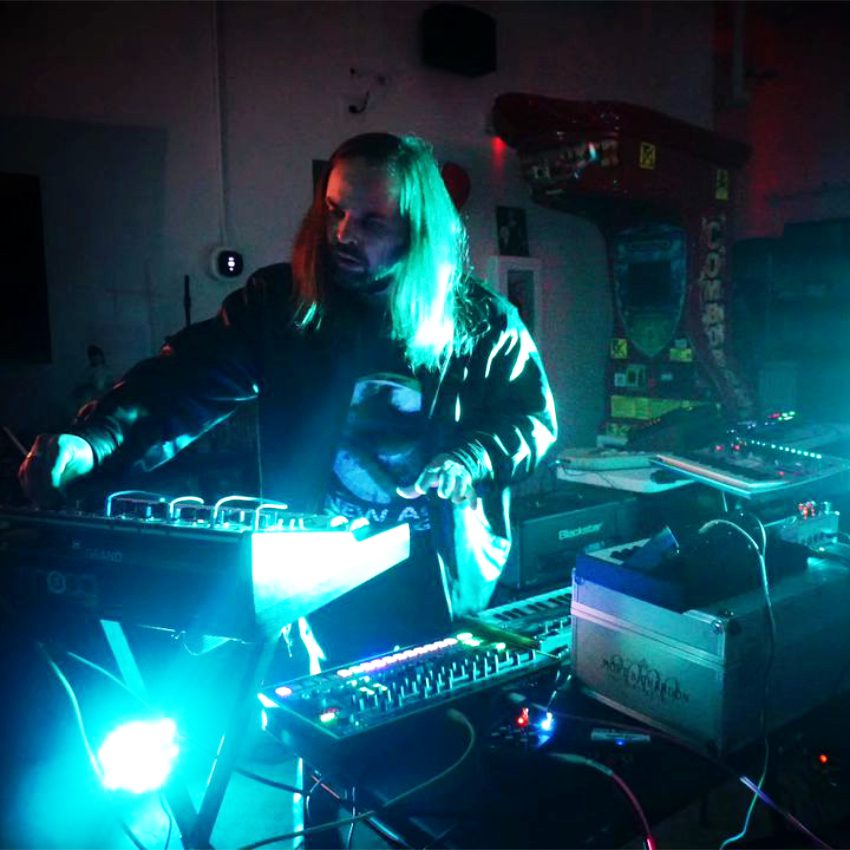
"Across Florida, there’s a diversity in artists and bands, for sure. I’m not as involved as I once was and have lost touch with some while meeting new friends along the way. The music scene here is constantly changing and I’m all for it. It feels like the pandemic was kind of a reset button on the music scene in Jacksonville."
Tell our readers about the DIY music and art communities in Jacksonville and the greater Florida region. How long have you lived in the state and when did you first get involved in playing shows?
I’ve grown up here, except for a brief period when I lived in Northern California. I’ve been playing in bands since highschool and got into helping to facilitate DIY shows in my early twenties. I’ve seen a lot of changes over the last two decades. Local music trends in Jacksonville are constantly evolving. In the early 2000s, there was an explosion of experimental and noise artists in Jacksonville, all starting bands and collaborating, then disbanding and regrouping in other projects.
I’ve been fortunate to bear witness to these brief movements. Of course, helping to bring people together for shows can be both rewarding and taxing. I’ve met some amazing artists over the years who have gone on to do great things and many more who thrive in obscurity, much like I have.
Florida, in general, has had a cohesive experimental and noise community, I think in part due to the International Noise Conference in Miami that went strong every year for over a decade. I’ve lost touch with some of that community after the pandemic hit. I’m not even sure if it’s still happening. But, the runoff of noise and experimental artists from that community still exist.
Across Florida, there’s a diversity in artists and bands, for sure. I’m not as involved as I once was and have lost touch with some while meeting new friends along the way. The music scene here is constantly changing and I’m all for it. It feels like the pandemic was kind of a reset button on the music scene in Jacksonville.
There were a lot of bad drugs going around in the scene leading up to 2020. There were countless overdoses and some ruined lives across the community. Then the pandemic shut down live music, completely. What emerged after was definitely different, but it feels like some darkness was purged in the process. I’m happy to make room for a new generation of artists and have been pleasantly surprised at some solid electronic music coming from younger Floridians in the aftermath. I wouldn’t want stagnancy to hinder progress. Flow is necessary for innovation. I think as long as we are making music that is timeless, ignoring trends, there will always be a place for experimental electronics in Florida.
You recently released your latest album, ‘End Time Loop’, two and a half years after your last release, ‘Tragic Seeker‘. What were points of inspiration for the new batch of tracks, and how has Severed+Said evolved since you first started the project a decade ago?
I can’t believe it’s been almost three years since ‘Tragic Seeker’ came out. That album was long in the making, recorded twice, and once it finally came out, I was eager to begin working on new material. Over the years, I’ve been slowly collecting all the equipment of what now makes up my current gear configuration and bedroom studio. As I mentioned above, my early set up was composed of what pieces I could find from pawn shops and craigslist ads.
My budget for music was non-existent in those years. I struggled for a long time getting gear together, but somehow made it work. I’m proud of those early recordings because they represent a certain innovation in working with what I had. But over the years I’ve come to a more stable place in life and have been able to seek and plan what gear with which I want to compose.
After ‘Tragic Seeker’ came out, I had finally gotten my hands on a hardware sequencer that I now use as the brain for all my synths. This changed my approach to composition greatly and I began working on ‘End Time Loop’ without much of an idea of what it was going to be about, but with the inspiration of being able to dream up much more complex sequences and variations. In addition, I had also finally gotten my hands on some semi-modular, analog synths that I fell in love with for making low-end drones. This was the leaping point for the tracks I began working on.
I knew I wanted to make a record that could change the physicality of the space in which it is performed. As the tracks solidified over the course of a year, the themes began to reveal themselves. I was born in the 1980s and, as I mentioned, I grew up in a staunchly religious family. I remember the satanic panic and Y2K scares. I remember growing up in a Pentecostal church and being yelled at by a sweating and foaming preacher about hellfire, brimstone, and other end time theologies. I remember when the towers fell in 2001 and the religious fervour associated with the middle east.
Frankly, this stuff terrified me as a child. I grew up fully expecting to see terrible tribulations unfold upon society. But as I came into my adolescence and separated myself from the church, I began to see more clearly the motives and self-fulfilling prophecies inherent in a lot of what was happening in the world.
Leaving the church as a teenager didn’t mean the end time scenarios were over. As the compositions for ‘End Time Loop’ solidified it was clear to me that all of these events are just part of a longer sequence of tragedies and travesties committed by and upon humankind, with the massacres happening now in Gaza being only the most recent of abominations. As we race toward what may seem like some end of time for us, a new era will begin, the vestiges of all our collective experiences in some different, but recognisable form.
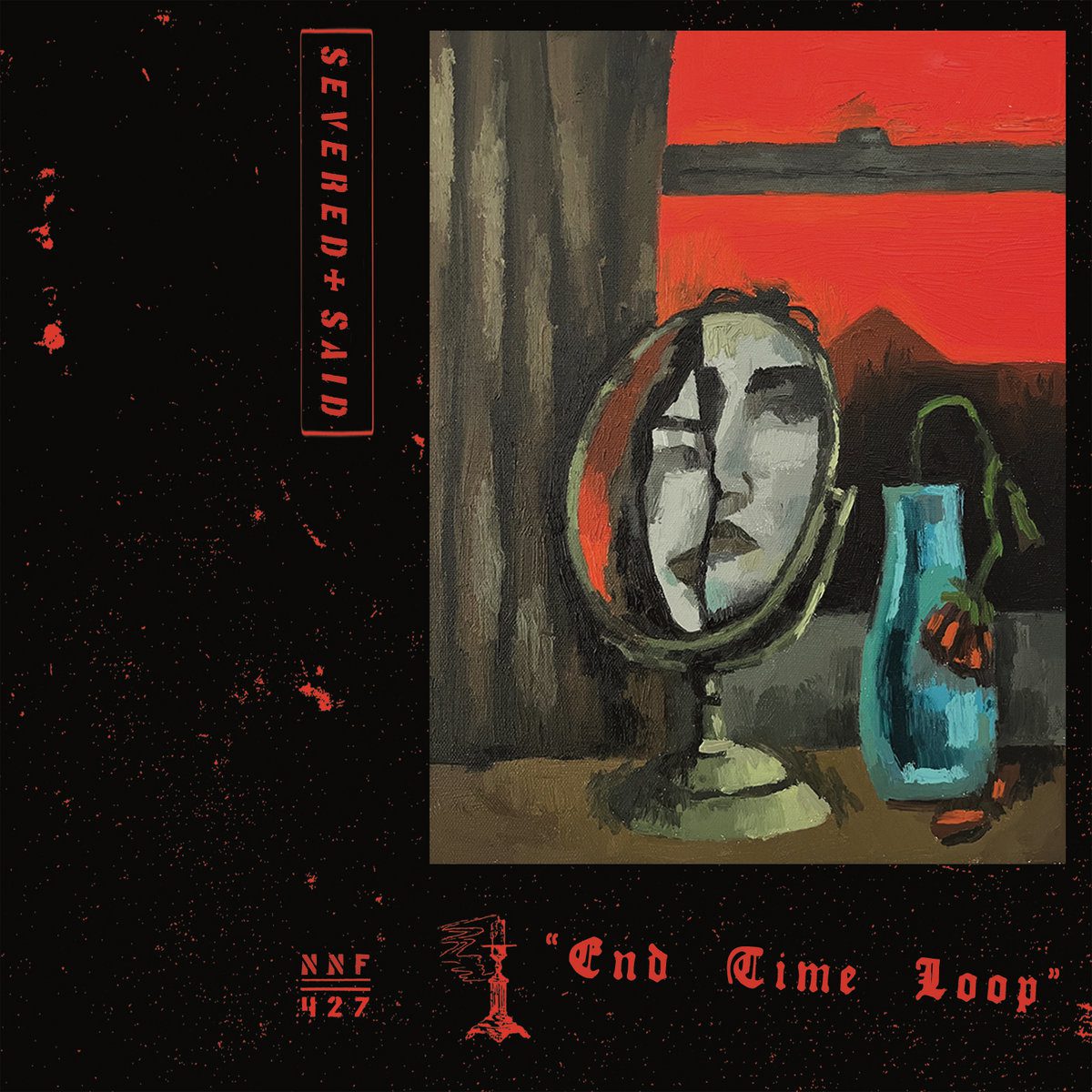
"Jason’s work draws you in. He creates these rooms or settings that feel liminal, some place between the conscious and subconscious. The colours he uses makes these spaces feel unnatural, but familiar and the figures he paints, angular and disjointed. His work is perfect for the themes I’m conjuring as an artist."
The artwork for your albums is always top notch. Can you talk about the art for End Time Loop?
Thank you. The album art and titles are always an important aspect of releasing an album for me. As an artist of instrumental music, it’s a way of hinting at what the work is about. Jason GVVL is a Jacksonville native who has mostly lived abroad and currently resides in Connecticut. He did the paintings for the album art for Tragic Seeker and now, End Time Loop.
We met in around 2017 or 2018 when he moved back to Jacksonville after living in Portland, Oregon for some years. He was already into Severed+Said, having been exposed to the music on the West Coast somehow and proposed that we should hang or work on something together. In the years leading up to Tragic Seeker, Jason would help me by making flyers for shows I was putting together here in Jacksonville. We became friends and then he moved up north.
In 2021, an album by PNW artist Fiona Moonchild was released for which Jason had done the album art. The painting struck me and I knew I had to ask him to do a painting for Tragic Seeker. Naturally, I thought of Jason when I was getting materials together for End Time Loop. He asked me what I had in mind, so I drew up a sketch.
Jason’s work draws you in. He creates these rooms or settings that feel liminal, some place between the conscious and subconscious. The colours he uses makes these spaces feel unnatural, but familiar and the figures he paints, angular and disjointed. His work is perfect for the themes I’m conjuring as an artist.
Your work has always had a moody, cinematic quality to it. In 2021 you collaborated on a soundtrack for the 1920’s silent film ‘The Cabinet of Dr. Caligari’. How did that come about and what was it like to craft a soundtrack? Did it differ from your usual songwriting process?
In 2018, my close friend and frequent collaborator, Jeremiah Johnson, started working as a sound engineer in a short lived studio here in Florida. Because he was working in the studio and taking care of the home it was attached to, he had access to the studio and we began experimenting with recording together.
We would gather weekly and come up with prompts for different approaches on which we would base a composition. Sometimes it would be inspired by some existing pieces of music or film score. Other times, we would have some recording experiment we wanted to execute. In any case, the studio eventually moved out to Los Angeles and so did Jeremiah.
Before he left, we recorded a body of tracks, all sonically unrelated, but interesting nonetheless. We considered releasing an album of some of our favourites, but because each track felt unrelated, Jeremiah proposed that we just do an original score. He had been in a Jacksonville band a decade or so earlier that had done some live scoring to pieces of ‘The Cabinet of Dr. Caligari‘ (1920) and he had always wanted to compose a complete version rendered to the film.
I remember seeing his band do live scores during the period they were attempting to do so and had always appreciated his work, so I was definitely up for the project when he made the pitch. Our approach to scoring Caligari was different from what a lot of current bands tend to do when scoring a silent film in that we wanted to react to the movements and moods of the film with sound, almost in an approach similar to foley sound design, rather than simply writing cool music to play over the film. However, instead of using or creating sound effects, we used synthesised sound design and orchestral samples to convey the moods of the characters.
We assigned different themes to each character and worked within that framework, the musical movements moving seamlessly with the movements and motives of the characters. The process was unlike anything I’ve done musically before. Since Jeremiah had moved to Los Angeles, I flew out to meet him in March of 2020 and we created a framework for the score.
The pandemic literally began whilst I was there. Businesses started closing and official mandates were issued. Luckily I was able to fly home. We spent the span of March of 2020 to March of 2021 finishing the score remotely, sending ideas and stems back and forth. With permission from Kino Lorber, we were able to secure one official screening of the film with our score on the 100th anniversary of the film here in Jacksonville at Sun-Ray Cinema, a beloved independent theatre here that unfortunately recently closed down due to corporate developers who purchased the historic building out of which they were working for over a decade.
We were both happy with the end results and put the score on streaming services under the moniker Vague, although we don’t publicly share the rendered film due to potential legal issues with the specific restored version to which we scored. We even began work on our second silent film this past summer. We’ve both been busy with other projects since then, so I’m not sure when we’ll be done, but we ensured that the version of the film we chose to score has no legal issues attached to it, so once it’s complete, we’ll hopefully be able to share this one publicly.
"Maintaining the balance between producing something that has very little value in our capitalist society and supporting the ability to do so with some form of waged labor is a tightrope act which takes a toll on every artist I’ve gotten to know through music."
The rise of streaming has made it harder for artists to make a living with their work. DIY music communities have been hit the hardest, where making music and art often takes a backseat to meeting basic needs. How do you balance the time to work and make a living with creating music?
I’m aware of how streaming has stifled artists’ ability to generate income with their music. For an artist, such as myself, it hasn’t had much of an impact since I’ve never made much money from my music, except for when I’m touring and selling merchandise in person, even then it’s never been enough to support myself.
When I was younger, I had dreams of being able to survive by being an artist, but the reality of that became clear to me a long time ago. I’ve had to work to support myself and my ability to continue making music. For a long time, much like many artists, I worked in the service industry. I always thought it was the most flexible field for me. But eventually, I felt myself giving more of my time and efforts for less and less return.
In 2018, I decided I would look into working in medical. My sister is a nurse and she would work these long shifts but have four or five days off a week if she wanted to. It was attractive as an artist to be able to get all my work in over a few shifts and maximize my time off. So for the last few years I’ve been working at a trauma hospital in imaging.
It’s an intense field, for sure. A hospital is sort of like a microcosm for society and comes with all that this statement entails. I’ve seen some terrifying aspects of humanity into which I’d previously had little insight. But I have most of my week free and I’m able to dump vast amounts of time into working on music. Not to say things have gotten easier. There’s a lot of psychological baggage that comes along with working in that environment, but I see music more now than ever as a healthy form of processing my emotions and dealing with the intensity of being face to face with violence and trauma on a weekly basis.
As I’ve gotten older, my situation as a working artist feels less unique. Almost every artist I know who has continued as long as I have has had to find a way to be stable enough to continue making music. Honestly, I don’t think there’s enough, if any, music journalism on the subject. Maintaining the balance between producing something that has very little value in our capitalist society and supporting the ability to do so with some form of waged labor is a tightrope act which takes a toll on every artist I’ve gotten to know through music.
The very idea of being an artist in the USA is so against the grain of capitalist normalcy that the act feels revolutionary. As things get worse and the gap between the very wealthy and the lower and middle classes widens, I think being an artist will become less monetarily rewarding, but more important as a contribution to society that does transcend the profit motives of the dominant economic systems within which we operate.
As climate disasters loom overhead with war crimes and genocide being funded by our taxes and while people within this country continue to suffer under the threat of poverty, music and art, in general, can imagine what society will look like after the levy breaks.
‘End Time Loop’ is out now via Not Not Fun Recprds. Order a cassette copy from Bandcamp.
Photography by @photographer.sal, DJ BoboRose, Jared Silvia, Ryan L’Heureux
TRACKLIST
1. Diminished Eternal
2. Dismal Symbols
3. Unchosen
4. Blighted Shores
5. Silent Incant
6. Initiate’s Echo
7. Scorched Psalm
8. Illusory Possession
9. Execrations
10. Prismal Shift
